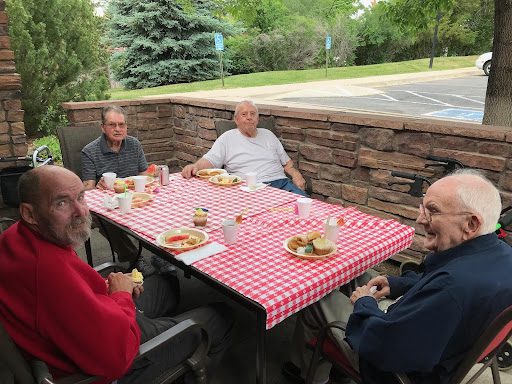
Aging is a journey that brings new opportunities and challenges. Self-care is very important in helping seniors maintain their well-being, independence, and overall happiness. Whether living at home, in a retirement community, or assisted living, prioritizing self-care can lead to a more fulfilling and active lifestyle.
But what exactly does self-care mean for seniors? It extends beyond basic health routines and encompasses physical, emotional, and social wellness.
Physical Well-Being
Regular movement, proper nutrition, and preventive healthcare are essential for maintaining mobility and independence. Engaging in light exercises like walking, stretching, or swimming can improve strength and balance, reducing the risk of falls. Seniors should also stay up to date on medical appointments, screenings, and medications to catch potential health issues early.
A nutritious diet filled with fruits, vegetables, lean proteins, and whole grains can help maintain energy levels and prevent chronic illnesses. Hydration is just as important, as dehydration can lead to fatigue, confusion, and other complications. Living in a senior housing community often provides structured meal plans and wellness programs to support these needs.
Emotional Wellness
Many seniors face challenges such as loneliness, anxiety, or depression, making emotional self-care a top priority. Practicing relaxation techniques, such as meditation or deep breathing, can help manage stress and promote a sense of calm. Engaging in hobbies like gardening, painting, or reading can bring joy and a sense of accomplishment.
Building a strong support system is another key factor in emotional well-being. Whether through family visits, support groups, or conversations with friends, staying socially connected can improve mood and overall outlook on life. Assisted living communities often provide social activities that encourage interaction and companionship, reducing feelings of isolation.
Social Connection
Relationships play a vital role in self-care. Seniors benefit from meaningful interactions with family, friends, and peers. Participating in community events, joining clubs, or volunteering can provide a sense of purpose and belonging. Technology can also bridge the gap by allowing seniors to stay connected through video calls, social media, and online groups.
For those living in a retirement community, structured social activities such as group outings, game nights, and educational classes can help foster relationships and create a strong sense of community. Even simple daily conversations with neighbors can improve mental well-being and create lasting friendships.
Cognitive Health
Keeping the brain active is a necessary self-care for seniors. Mental stimulation can help slow cognitive decline and improve memory. Activities like puzzles, reading, writing, or learning a new skill can keep the mind engaged. Many assisted living communities offer programs that include music therapy, language classes, and interactive discussions to support cognitive health.
Good sleep hygiene plays a role in brain function. Establishing a consistent sleep schedule, limiting screen time before bed, and creating a relaxing nighttime routine can contribute to better sleep quality and overall mental sharpness.
Personal Independence
Seniors should have the ability to make choices about their daily lives, from meal preferences to recreational activities. A retirement community or assisted living facility that promotes independence while providing necessary support allows seniors to feel in control of their own lives.
Having access to transportation, assistance with daily tasks, and a safe living environment can help seniors continue to live with dignity. By striking the right balance between receiving support and maintaining autonomy, seniors can enjoy a higher quality of life.
Experience personalized care, engaging activities, and a welcoming community at The Oberon House. Schedule a consultation and see how we make every day meaningful!
